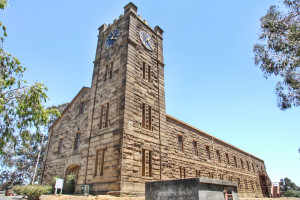
The elevator in the historic Clock Tower is thought to have been put in the building prior to 1915. Keri Luiz / Staff
That’s the situation facing Benicia City Council Tuesday night as it addresses the elevator in the historic Clock Tower building.
The elevator is thought to have been put in the building prior to 1915, City Manager Brad Kilger wrote the Council July 9. The building itself dates to 1859 and is identified as the first United States military fortress built in the west, he said.
An inspection earlier this month after a couple of malfunctions uncovered what Kilger called “defects beyond repair.” In fact, the damage was so severe, operation of the elevator was stopped immediately.
But the Clock Tower — the city’s largest rental site — is a popular venue for events, from fashion shows to chili cook-offs, dances, dinners and auctions. It’s also used for classes.
More than 100 events take place there each year. It can seat 536 and has a maximum standing capacity of 750.
“A number of weddings and other large events are scheduled at the Clock Tower through fall,” Kilger wrote.
City employees already have contracted for temporary access to the building’s second floor to keep Benicia in compliance with the Americans with Disabilities Act standards. Without handicap access to the second floor, the city would be in violation of the law.
Cost of renting the temporary elevator from Bigge Crane and Rigging Company for 12 weeks is $71,232, he wrote. A new permanent elevator will cost the city $229,900.
Money for those unexpected expenses will have to come from the General Fund’s reserves, Kilger wrote
Because the Clock Tower is a historic building. A landmark in the Arsenal Historic Conservation Plan, these actions need evaluation for physical, historical and archeological impacts under the California Environmental Quality Act (CEQA), he wrote.
To brace the temporary elevator, four one-inch diameter holes must be drilled into the belly band between the first and second floor, he wrote. Once the brace is removed, the holes would be patched with matching concrete to disguise them, a procedure that is consistent with the Secretary of Interior Standards for Rehabilitation, Kilger wrote.
“Given the critical nature of the elevator and the unique characteristics of the Clock Tower, the failure of the elevator has created an emergency situation,” he wrote. The city can’t afford delays that a formal bidding process would cause, he added.
Employees contacted a local company, Dream Ride Elevator, that installed the elevator in the Commanding Officer’s Quarters, another historic building owned by the city, Kilger wrote.
To expedite installing the permanent elevator, employees the company’s price estimate, $229,900, and installation schedule, about 12 weeks.
Meanwhile, to keep the city in compliance with disability access law, employees considered two temporary options, a temporary elevator, costing $71,232, or a 200-foot temporary ramp costing $67,500. Kilger wrote that employees concluded the temporary elevator would be more effective “and aesthetically appropriate.”
The Council will be asked to confirm the emergency contracts.
The matter is on the Consent Calendar of the panel’s meeting. Items on that calendar can be decided by a single vote without discussion unless a member of the Council or the public chooses to have one of the topics considered by separate vote.
If You Go
The Council will meet at 6:30 p.m. Tuesday in a closed session to discuss legal matters. The regular meeting starts at 7 p.m. Tuesday in the Council Chamber of City Hall, 250 East L St





